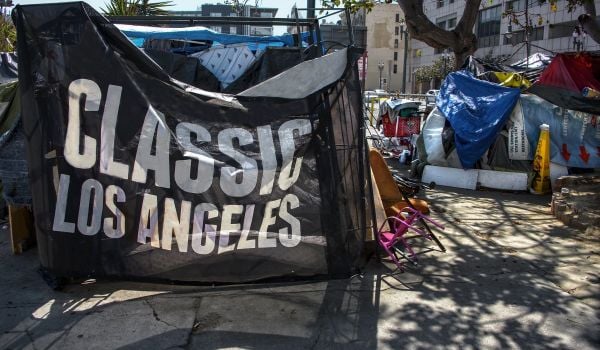When you think of a city with a housing market that caters to the wealthy and provides few options for people earning average wages or below, chances are good that you think of San Francisco before you think of Durham, North Carolina. But officials in both cities have good reasons to invest in a range of affordable housing types, and last week, voters in San Francisco and Durham each approved the largest housing bond in their city’s history.
In Durham’s case, it was a $95 million bond to be spent over the next five years. Durham Mayor Steve Schewel proposed the bond in February, saying that if Durham carried on its existing housing efforts without an infusion of funding, downtown neighborhoods would remain “the province of upper-middle-class white people, while people of color are pushed to the margins, farther and farther from good jobs and the public transit to get them to those jobs,” according to a report in the Indy Week.
Durham currently has around 8,600 income-restricted affordable units, according to city estimates. If it wants to provide enough housing just for the residents who are currently facing a severe cost burden — spending more than half their income on rent — it will need to build 16,000 new affordable housing units, the city estimates. Despite being the biggest housing bond the city has ever approved, the $95 million would still only provide for a fraction of the need.
According to the city’s plan, $95 million in bond proceeds will be spent on “brick and mortar” aspects of housing production and preservation, and $65 million in local and federal funding will be dedicated for homelessness services and other goals. The bond would allow the city to build 1,600 new affordable-housing units and preserve 800 affordable rentals, according to the plan. It would also help 1,800 homeless families families find permanent housing, and provide affordable homes for 400 first-time homebuyers.
The largest category of spending over the next five years — $58.9 million — would go toward redeveloping public housing units under the federal Rental Assistance Demonstration program. The RAD program is an attempt to make up for federal defunding of public housing by allowing cities to spend to redevelop public-housing projects, transfer them to private ownership, and subsidize their rents through a Section 8 model of rental vouchers. Existing residents are supposed to have a right to occupy new apartments after the projects are redeveloped. The program has been growing over the last year, as Next City reported earlier this week.
The plan would also provide gap financing for Low Income Housing Tax Credit projects, subsidies for new multifamily developments, and funding for emergency housing for homeless families, eviction diversion, home repair, and downpayment assistance.
“It will give us the best chance possible to fight for our residents who are most in need,” City Council member Vernetta Alston said in a video encouraging voters to support the bond. “The affordable housing bond will set a standard for the level of responsibility and investment that cities and communities should make together, for each other.”
The Durham housing bond was approved just a few months after the City Council passed a bill allowing denser housing developments in the downtown area, in order to give more residents better access to jobs and transit. The bond is expected to cost homeowners an average of $37 a year in additional property taxes for 20 years, according to the city. It was approved with 76 percent of the vote, and Schewel was easily elected to a second term, WRAL reported.
Last week, San Francisco voters approved two ballot measures aimed at bringing more affordable housing to one of the least affordable cities in the United States. One of the measures, Proposition E, would allow 100-percent-affordable housing projects to be built on certain large lots in residential zones throughout the city, and would reduce regulations and expedite permitting on such projects. Many advocates have argued that local zoning rules and practices limit the production of affordable housing around the city unnecessarily, making the housing shortage worse.
“Prop E’s overwhelming victory proves the readiness of San Francisco voters to open up zoning in the outer neighborhoods that have not seen affordable housing in decades: people across the city do want housing in their neighborhoods, affordable to their neighbors, their seniors, their children, and their teachers,” Fernando Marti, co-director of the Council of Community Housing Organizations, said in a press release after the vote.
San Francisco voters also approved Proposition A, a $600 million housing bond that is larger than any housing bond the city has passed before, as Next City wrote in June, when the bond was still being designed. The bond was reportedly approved by 71 percent of voters last week, crossing the two-thirds threshold needed to win. It would commit $220 million to producing housing for people low-income and extremely-low-income renters, $150 million to rehab certain public-housing projects, $150 million for senior housing, $60 million to preserve rental housing for middle-income residents, and $20 million to new housing for teachers.
Elsewhere in California, San José officials are preparing another housing bond proposal based on a new real estate transfer tax on properties worth more than $2 million, according to San José Spotlight. A $450 million bond failed in San José last year. Advocates in San Diego are also pushing for a $900 million housing bond sometime next year. Also last week, the reelection of progressive city council members in Seattle was seen as a blow to Amazon, which had waged an expensive campaign to defeat them after several members had supported a tax on business to pay for solutions to the city’s housing crisis.
This article is part of Backyard, a newsletter exploring scalable solutions to make housing fairer, more affordable and more environmentally sustainable. Subscribe to our weekly Backyard newsletter.

Jared Brey is Next City's housing correspondent, based in Philadelphia. He is a former staff writer at Philadelphia magazine and PlanPhilly, and his work has appeared in Columbia Journalism Review, Landscape Architecture Magazine, U.S. News & World Report, Philadelphia Weekly, and other publications.
Follow Jared .(JavaScript must be enabled to view this email address)


















